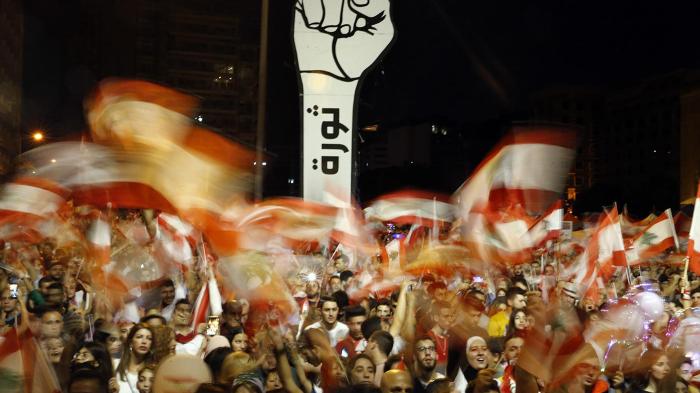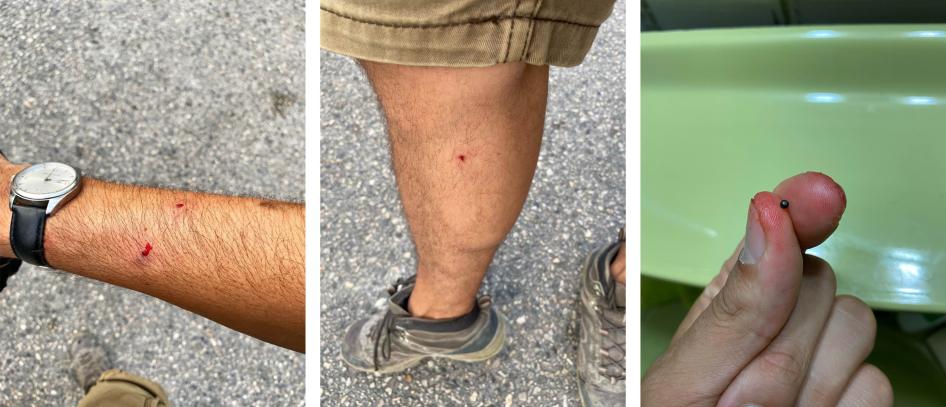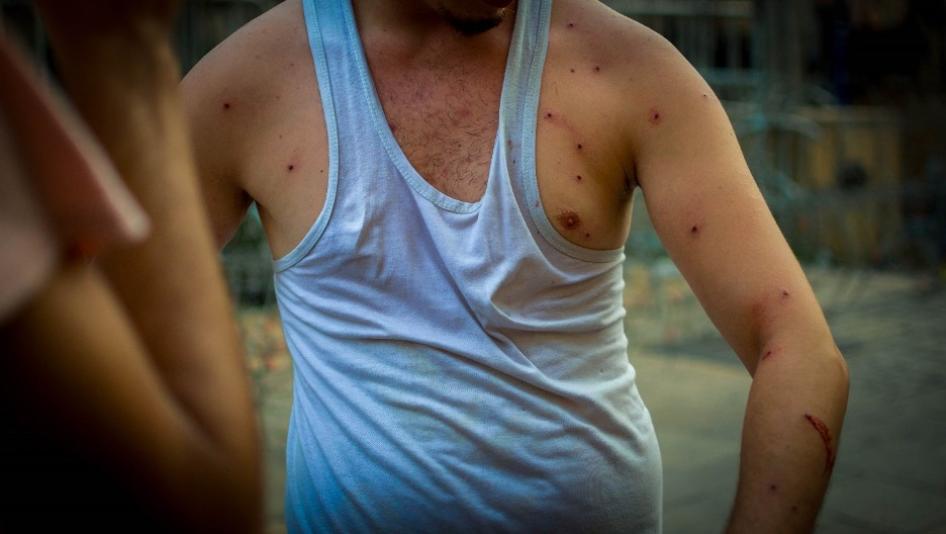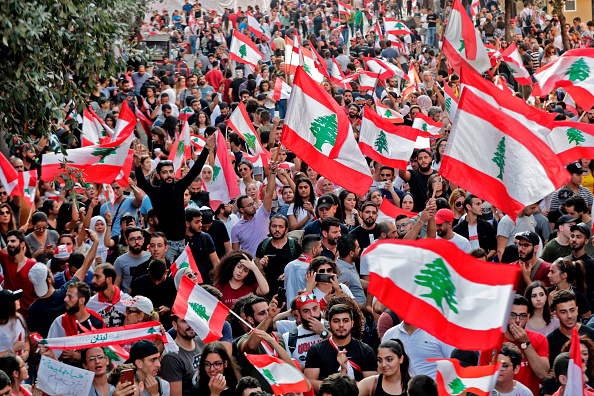Lebanon Protests

Lebanon has seen mass anti-government demonstrations since October 17, 2019, when the government announced a slew of new taxes. The countrywide protests devolved into expressions of anger against the entire political establishment, whom protesters blame for the country’s dire economic crisis. State security forces at times used excessive force against demonstrators and failed to protect them from violent counter-protesters. The economic crisis and an irresponsible fiscal policy threatens people’s access to health care and food, and has driven many families into poverty. Vulnerable groups, including refugees and migrant workers, have been particularly hard hit by the economic crisis.
Security Forces Use Unlawful Metal Pellets Against Protesters, Again
Security forces appear to have used excessive and unlawful force against protesters during an anti-government demonstration in downtown Beirut on September 1. According to video and witness evidence, security forces fired large quantities of teargas and metal pellets at demonstrators, including at media workers, and beat and kicked protesters.
Human Rights Watch spoke with a photographer who was injured by metal pellets, a photojournalist who documented their use, and a protester who was beaten by security forces.
The photographer who Human Rights Watch spoke with said five metal pellets embedded in his body. He said that some time in the afternoon, protesters were able to break open a gate that leads to the parliament compound. Security forces launched teargas at protesters, and, as he was leaving the area, the photographer heard two loud explosions that he said may have been explosive devices. The metal pellets embedded in his body immediately after he heard the explosions. Human Rights Watch documented a similar incident on August 8.
A photojournalist also told Human Rights Watch that she saw a protester injured by metal pellets at 6:15 pm, soon after he sustained the injury. Human Rights Watch verified her photographs. She said the protester was injured near one of the entrances to the parliament compound on Waygand Street that was blocked by metal gates, from which she saw shotguns being aimed directly at protesters from in between the metal panes.
The United Nations guidance on “less-lethal” weapons in law enforcement states: “Multiple projectiles fired at the same time are inaccurate and, in general, their use cannot comply with the principles of necessity and proportionality. Metal pellets, such as those fired from shotguns, should never be used.”
Human Rights Watch had documented the use of metal pellets for the first time in Lebanon during a protest on August 8. Human Rights Watch found that metal pellets fired by shotguns were the main cause of many serious injuries on August 8, including injuries to protesters’ eyes and vital organs. Given their inherently inaccurate nature, indiscriminate impact, and evidence of the serious injuries they have caused, the use of shotguns firing multiple pellets – rubber or metal – against demonstrators at any range should cease immediately.
Video footage suggests that security forces fired large quantities of teargas at protesters, including from armored vehicle mounted multi-barrel projectors, and including at protesters gathered in Martyrs’ Square.
Both the photojournalist and photographer told Human Rights Watch that security forces were firing teargas at a low angle. The photographer was hit by a teargas canister on his right foot as he was running away at around 7:20 pm. "Someone helped me to walk away because I wasn't able to walk after being hit,” he said.
The photojournalist also said that as she was filming protesters entering the parliament compound near the Bab Idriss entrance, security forces launched large quantities of teargas directly at protesters, and one canister went between her legs.
International norms on the use of teargas projectiles say that tear gas should only be used to disperse unlawful assemblies where necessary and proportionate and that they should be fired at a high angle. Human Rights Watch opposes its use to disperse non-violent assemblies. Projectiles should not in general be fired directly at individuals and should not be fired at the head or face. Skip-firing projectiles off the ground carries an unacceptable risk of indiscriminate injury.
Police dressed in anti-riot gear also beat protesters. In one incident, video and witness evidence suggests that many police officers beat and kicked a protester who had fallen to the ground. Human Rights Watch spoke with the protester, Marwan, who said that he initially intervened to help a girl who was being beaten by the police.
“She was able to escape, but I fell on the ground. Thirty people were beating me, kicking me, using batons…I didn’t know where the beating was coming from,” he said. Marwan was hearing a helmet and teargas mask, so his head was protected. However, he suffered a hairline fracture on his leg and bruises all over his body.
The Lebanese Red Cross announced that it treated 20 injured at the scene and transported one to a hospital.
Excessive Displays of State Violence in Beirut
Lebanon’s security forces used excessive levels of violence against tens of thousands of protesters who had gathered in downtown Beirut on August 8, 2020, to express their rage and frustration over the government and political elites’ incompetence and corruption that is widely considered to have led to the August 4 blast at Beirut’s port, which devastated the city. Human Rights Watch, Amnesty International and some Lebanese civil society groups have called for an independent investigation by international experts to determine the causes and responsibility for the explosion and recommend measures to ensure it cannot happen again.
Human Rights Watch observed security forces launching excessive amounts of tear gas to disperse protesters, especially at the entrances to parliament. While a small number of protesters hurled rocks and debris at security forces, the harmful effects of the tear gas reached peaceful protestors in areas in the northwestern part of the Martyr’s square. The clouds of tear gas were so thick that Human Rights Watch researchers were not able to ascertain which security forces were responsible for launching the tear gas.
Human Rights Watch also observed security forces fire a tear gas canister directly at a protester’s head, in violation of international standards, severely injuring him. The protester was merely standing in the Azaria parking lot, next to the medics’ station. First responders told Human Rights Watch that they treated several blunt force traumas to the head caused by tear gas canisters.
The canister came from the same direction where minutes before security forces were firing 1-2 meters above our heads. Teargas canisters should never be fired directly at the head or face. https://t.co/3nuwZCP9wm
— Richard Weir (@rich_weir) August 8, 2020
Human Rights Watch researchers observed security forces firing rubber bullets and birdshot pellets indiscriminately at protesters, as well as security forces behind the Al Amin Mosque and Virgin Megastore building aiming weapons directly at protesters on the afternoon of August 8. Human Rights Watch reviewed and verified footage showing a protester who had been shot by a rubber bullet in the neck and another in the chest. Two protesters told Human Rights Watch that they had been hit by pellets. Another protester witnessed his friend being shot by what looked like small pellets on his chest, and he showed Human Rights Watch researchers a video documenting the injuries. A doctor at Beirut’s Hotel Dieu Hospital tweeted that his team treated a patient whose heart had been punctured by a rubber bullet.
A video circulating on social media showed an unidentified man in plainclothes shoot a handgun at protesters. Human Rights Watch has not yet been able to verify the man’s identity. He was surrounded by members of the army and a uniformed member of the security forces, who did nothing to stop him. Some protesters claimed security forces were shooting live ammunition at protesters in Martyrs’ Square, but Human Rights Watch has not yet been able to verify these reports.
The army also used excessive force when they beat protesters with sticks and their bare hands. They also attacked observers, including a journalist and a Human Rights Watch researcher, around the Ring Road area. The army tried to stop the journalist and researcher from filming their attack on protesters.
Throughout the evening, protesters stormed the Foreign Ministry, Economy Ministry, Environment Ministry, Energy Ministry, and the Association of Banks. Most of these buildings had been severely damaged by the blast.
Some protesters were hurling tear gas canisters back at security forces and lobbing rocks, other debris, and Molotov cocktails. However, most of the protesters were peaceful.
Security forces arrested twenty protesters, according to the Committee for the Defense of Protesters.
Numbers compiled from the Lebanese Red Cross and the Islamic Emergency and Relief Corps show 728 people were injured, 153 of them taken to hospitals for treatment The Internal Security Forces (ISF) announced that one of its members died while trying to save people trapped at the Le Grey hotel. They said 70 ISF personnel had been injured. The Army stated that 105 of its soldiers were injured, including two who were in critical condition.
Human Rights Watch is compiling videos and conducting further analysis to determine which security units are responsible for prohibited conduct and violations of international human rights laws and norms.
All of a sudden, Army started beating protesters viscously near ring. As I was filming, army beat me and threw my phone away. Army still beating other protesters. #LebanonProtests pic.twitter.com/COQbWRGzC8
— Aya Majzoub (@Aya_Majzoub) August 8, 2020
Spate of Free Speech Prosecutions
A spate of prosecutions since the outbreak of nationwide protests on October 17, 2019 against activists and journalists critical of government policies and corruption is threatening free speech and opinion in Lebanon.
Security agencies called in at least 29 people for interrogation concerning free speech charges, including insult and defamation, between October 17, 2019 and March 6, 2020. Insult and defamation are criminal offenses in Lebanon, with prison terms of up to three years. Media also reported that at least 20 people, including at least 18 children, were briefly detained and interrogated in 2 separate incidents for tearing down posters of politicians and the president.
“The state is using these repressive tactics to intimidate us into stopping our protest activities,” Jaber told Human Rights Watch. “But after October 17 is not the same as before October 17…. We won’t let them take the dream from us.”
Laws that allow imprisonment over peaceful criticism of individuals or government officials are incompatible with Lebanon’s international obligations to protect freedom of expression, Human Rights Watch said.
In November, Human Rights Watch released a report detailing a year-long investigation into attacks on freedom of expression in Lebanon. The investigation found that in dozens of cases between 2015 and 2019, public officials and security forces used criminal defamation and insult laws to retaliate against and silence people who criticized public officials or government policies, resulting in a chilling effect on free speech.
Medical Supplies Scarce as Coronavirus Spreads
The health minister, Hamad Hassan, warned today that Lebanon was no longer focused on containing the coronavirus outbreak as the virus spreads, but rather on mitigating its impact. Six new cases were confirmed today, raising the total number of people infected with coronavirus in Lebanon to 22.
The Lebanon World Heath Organization (WHO) representative in Lebanon, Iman Shankiti, predicted that the outbreak will grow, challenging Lebanon’s already struggling medical sector.
The spokeswoman for Lebanon’s medical supply importers, Salma Assi, told Reuters, “if we are talking about masks and gloves, there is none. We are completely out of stocks and this issue is because for five months we haven’t been able to import.” Assi added that medical supply importers have brought in just $10 million of the $120 million in goods they have sought since October, and nearly all transactions have been frozen since February.
Medical suppliers who provide equipment for both public and private hospitals told Human Rights Watch in December that they have not been able to import medical equipment since September due to the shortage of dollars and the absence of government regulations that would prevent banks from arbitrarily restricting money transfers outside the country.
The head of the Syndicate of Private Hospitals, Sleiman Haroun, also told Human Rights Watch that the government owes private hospitals more than 1.3 billion dollars, compromising their ability to provide urgent healthcare. Haroun said that the government has not paid private hospitals “a single pound” of the dues owed to them in 2019.
Despite the medical community sounding the alarm on several occasions, the Lebanese government has not yet put in place any measures to meet the challenges that the economic crisis has posed to access to medical care, medicine, and medical equipment.
In response to the coronavirus outbreak, Lebanese authorities have closed schools and entertainment venues, cancelled sporting events, and halted flights from countries with high rates of infection. However, Lebanese citizens have stated that they have little faith in the government’s ability to manage the outbreak. On March 2, the Prime Minister admitted that “the state is no longer capable of protecting the Lebanese people.”
Life for Lebanon’s Migrant Domestic Workers Goes From Bad to Worse
Hardly anyone in Lebanon has been left unscathed by the economic crisis, the worst since the end of the civil war in 1990. Its impact has been most devastating on communities already marginalized prior to the crisis. The situation for the estimated 250,000 migrant domestic workers, for instance, who are excluded from labor law protections, has gone from bad to worse.
Many domestic workers have reported that their employers slashed their salaries—if they paid them at all. But even the more fortunate workers who are still receiving their salaries in full have seen their money’s value decrease by almost a third as the Lebanese lira depreciates.
Making matters worse, even though some migrant workers stand to effectively lose out on half of their pay or more, they cannot readily leave their employers or advocate for better pay or conditions. Their presence is regulated under a kafala (sponsorship) system—which former Labor Minister Camille Abousleiman likened to “modern-day slavery”—under which they cannot leave or change jobs without their employer’s consent. Giving employers this level of control over workers’ lives has led to an array of abuses that Human Rights Watch has been documenting for years, including non-payment of wages, forced confinement, no time off, and verbal, physical, and sexual abuse.
For years, the Lebanese government has been shirking its duty to protect migrant domestic workers, leaving employers, recruitment agencies, and embassies to manage the working relationship—often with disastrous consequences for the workers. As the economic crisis worsens and the situation of migrant domestic workers becomes even more precarious, the government should no longer look the other way.
The new Labor Minister, Lamia Yammine, has an opportunity to correct this historical injustice. Dismantling the kafala system will not solve the economic crisis, but it will ensure that the tens of thousands of women who left their homes and families to work in Lebanon are not left to bear the brunt of it.
World Bank Warns Lebanon at Risk of “Implosion”
Lebanon was at risk of “implosion” unless it develops a new governance model that is less corrupt and more transparent, the World Bank warned on February 16 . Farid Belhaj, the bank’s most senior official for the Middle East and North Africa, underscored the importance of politicians implementing some much-needed reforms, including improving the electricity supply and reforming the education sector.
Kristalina Georgieva, managing director of the International Monetary Fund (IMF), delivered a similar message when she said that the IMF will consider financial assistance to Lebanon only “if we are convinced that there is a seriousness in the approach the government is taking.” On February 13, the government of Prime Minister Hassan Diab asked the IMF for technical assistance for an economic “rescue plan.” The IMF announced that a team of experts will begin consultations with the Lebanese government on February 20.
Under a new policy announced in April 2018, the IMF affirmed that tackling corruption will be a key pillar of its programming. The IMF said that it will analyze countries’ financial governance to get an idea of how rampant corruption is, and the economic impact. If it concludes corruption is having a significant economic impact, the fund will offer policy advice and in some cases financial assistance to strengthen governance.
While the nature of the IMF’s assistance to Lebanon is not yet clear, the IMF should ensure that its recommendations do not have an adverse impact on access to basic rights.
Lebanon is at risk of “implosion” unless it develops a new governance model that’s less corrupt and more transparent than today’s system, warns the World Bank https://t.co/h6qGQNr5rA
— Bloomberg Politics (@bpolitics) February 17, 2020
Violence Ahead of Government Confidence Vote
Lebanese security forces, including riot police, parliament police, army paratroopers, and army commando regiments, encircled the parliament building in downtown Beirut and clashed with protesters ahead of a vote of confidence for the new cabinet.
Thousands of protesters gathered around the entrances to parliament early on February 11 and tried to obstruct MPs from attending the session. Protesters reject the new cabinet, saying its members have clear connections to established political parties and are unable to address the economic crisis.
Human Rights Watch observed security forces launching tear gas to disperse protesters at the entrances to parliament, and fired some canisters directly at protesters in violation of international standards. A teargas canister went through a woman’s cardboard sign and burnt the flag around her neck. A journalist reported being hit in the leg with a teargas canister.
Security forces also used water cannons to disperse protesters around the Annahar building. Two protesters from Tripoli told Human Rights Watch that security forces launched teargas and aimed water cannons at them around the Annahar building at 8 a.m. without any provocation. A local media watchdog reported that security forces fired a rubber bullet that hit a photographer’s in the mouth near the Annahar building.
Human Rights Watch observed soldiers beating protesters around the ESCWA building, and saw riot police beating protesters around the Zkak el-Blat entrance. One injured protester told Human Rights Watch that a riot police officer threw a rock that hit his head near the Riad al-Solh entrance. Some supporters of Amal and Hezbollah also threw rocks at protesters around the Ring road and Zkak el-Blat.
The protests were overwhelmingly peaceful in the morning, but Human Rights Watch observed a few protesters throwing rocks at security forces and hurling teargas canisters back at them. Other protesters threw water bottles, rocks, and eggs at the parliamentarians’ convoys. One parliamentarian was transported to the hospital after protesters attacked his convoy.
Around noon, after the parliamentary session started, some protesters attempted to break into Nejmeh Square, where parliament is located. They threw rocks and fireworks at security forces and removed at least two of the concrete and metal barriers that security forces had set up around the compound’s perimeter. Security forces escalated their response, launching large amounts of teargas, firing rubber bullets, and beating protesters.
As of 4:30 p.m., the Lebanese Red Cross reported treating 328 injuries at the scene and transporting 45 to nearby hospitals.
This young girl climbed onto the concrete barriers around parliament raising the #Lebanon flag. Security forces fired water cannons at her to get her down. They formed a rainbow behind her instead. #LebanonProtests #لبنان_ينتفض pic.twitter.com/GtvuZORi9q
— Aya Majzoub (@Aya_Majzoub) February 11, 2020
Lebanon’s Military Courts Have No Business Trying Civilians
At least two civilians have appeared before military courts in Lebanon in recent days, prompting fresh concerns over authorities’ attempts to stamp out dissent in the country. Hassan Yassine and Nour Chahine both face charges related to their involvement in the protest movement currently sweeping Lebanon.
Activist Hassan Yassine, who the Internal Security Forces (ISF) arrested during a protest in Beirut on January 22, 2020, has been charged by the military prosecutor with “forcefully resisting security forces.” He appeared before the Military Tribunal on February 3. The Lawyers’ Committee for the Defense of Protesters said that a forensic doctor who examined Yassine while in detention found his body bore marks of abuse, which the committee say resulted from the ISF beating him during his arrest and before his interrogation at the El Helou police station.
Another man from Tripoli, Nour Chahine, has been charged with attempting to kill a member of the army and with “resisting the security forces” in front of Beirut’s parliament. Chahine turned himself in to the military intelligence branch in Tripoli on December 25, 2019 and has been detained at the Defense Ministry and Military Police branch in Rayhaniyya ever since. According to the Lawyers’ Committee for the Defense of Protesters, Chahine was not allowed to contact his family or meet with a lawyer before his interrogation. He first appeared before the Military Tribunal on January 31, and before a military investigative judge on February 4. During his first hearing, Chahine alleged that he was tortured while being interrogated at the Defense Ministry.
A 2017 Human Rights Watch investigation revealed the many due process and international law violations inherent in trying civilians before military courts in Lebanon.
Military courts have no business trying civilians. Lebanon’s parliament should end this troubling practice by passing a law to remove civilians from the military court’s jurisdiction entirely.
Podcast: Security Forces’ Unlawful Use of Force
Aya Majzoub, Lebanon and Bahrain researcher at Human Rights Watch, spoke with the hosts of The Lebanese Politics Podcast, Nizar Hassan and Benjamin Redd, about the security forces’ unlawful use of force against demonstrators since the protests began on October 17, 2019. Listen to the episode here.
National Human Rights Institute Launches Roadmap
Lebanon’s National Human Rights Institute (NHRI) held a session today with civil society, including Human Rights Watch, to discuss its roadmap for the next year and its engagement in reporting and advocacy ahead of Lebanon’s Universal Periodic Review at the Human Rights Council in November 2020.
The 10-member National Human Rights Institute is an official body established on October 19, 2016 to monitor the human rights situation in the country by reviewing laws, decrees, and administrative decisions and by investigating complaints of human rights violations and issuing periodic reports of its findings.
The NHRI includes the 5-member National Preventative Mechanism against Torture (NPM), mandated to oversee the implementation of the anti-torture law in September 2017. It will have the authority to conduct regular unannounced visits to all places of detention, investigate the use of torture, and issue recommendations to improve the treatment of detainees. The members will be able to interview detainees privately and outside the presence of guards. Lebanese authorities are legally obligated to cooperate with the unit and facilitate its work. The NPM is a body Lebanon is required to have set up under the Optional Protocol to the Convention against Torture, which it ratified on December 22, 2008.
The roles of the NHRI and the NPM are especially critical during this period of mass protests in Lebanon. Human Rights Watch has documented the security forces’ excessive use of force against protesters, and tens have alleged torture by security forces, including severe beatings and threats of sexual violence.
However, the 2020 state budget that parliament passed on January 27 does not include any funds allocated to the NHRI and the NPM, which would allow these bodies to fulfill their mandates. The NHRI’s members stated that they are currently working in a volunteer capacity and do not have a headquarters from which to operate and receive citizens’ complaints. If Lebanon is serious about combatting torture, it should quickly ensure that the institutions it set up to end torture have the resources they need to effect real change.





